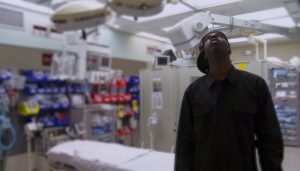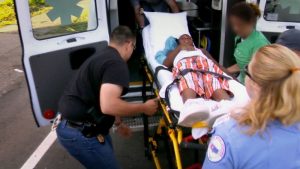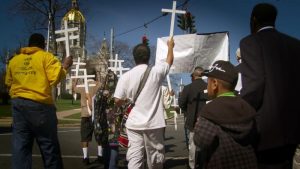Hartford gun-violence doc ‘The Sweetest Land’ to be screened in New Haven
Read On the Hartford Courant by Susan Dunne
In 2009, Aswad Thomas was a college grad and was looking forward to a career playing basketball in Europe. That didn’t happen. On Aug. 24, Thomas was shot on Albany Avenue in Hartford while leaving a convenience store.

Thomas survived and walked again, but his life changed forever. Instead of sports fame, Thomas got a master’s degree in social work from UConn and is now managing director of Crime Survivors for Safety and Justice.
Thomas is one of the community members, first responders, social workers and health workers featured in “The Sweetest Land,” a film about street violence in Hartford. The movie is having its Connecticut premiere on May 30 at the New Haven Documentary Film Festival (NHDocs).
“I want my story to be told. Being released from the hospital back into the same community where the incident happened was a very traumatic experience. There was no follow-up,” Thomas said in a phone interview. “There should have been opportunities to connect myself and my family to counseling, housing relocation. That’s the least you can do.”
The documentary was made — starting about 10 years ago — by Jeffrey Teitler, a filmmaking professor at Central Connecticut State University in New Britain. Teitler also is an artist in residence at Saint Francis Hospital and Medical Center in Hartford, a position he took to facilitate the filmmaking process.
The premise of the documentary is that Thomas’ experience is common for victims of violence in Hartford and that most organizations dedicated to violence prevention and victim services aren’t succeeding.
“Every patient comes [to Saint Francis] on death’s door. A mass of trained, skilled people are urgently helping this patient. All their resources go into this individual and family,” Teitler said in an interview at Saint Francis. “Then you follow the family out of the hospital and there is absolute abandonment.
“Organizations that are supposed to be helping them have awards ceremonies and accolades, but on an anecdotal level, I couldn’t find anything of value there,” he said. “The conversation of prevention has not occurred in the way it needs to have occurred. There needs to be a standard of care.”

Teitler cited statistics from a “Blueprints for Violence Prevention” national study that estimated that the effectiveness rate for violence-prevention and victim-services projects nationwide at 5 percent.
That study, developed by the Center for the Study and Prevention of Violence at the University of Colorado–Boulder, rigorously studies the effectiveness of programs geared toward curbing youth violence and delinquency, with the goal of developing evidence-based models for effective programs.
In citing that statistic, Teitler emphasized that the problems with program effectiveness in Hartford are mirrored nationwide.
“In the event of a death [at Saint Francis], there is a rigorous investigation. If you ask a nonprofit for an evaluation of that loss, what interventions had been done, there’s no info. How is that possible?” he said. “These disconnected organizations somehow are missing the target. Some of these organizations can’t articulate the methods they use.”
Teitler filmed much of “The Sweetest Land” in Saint Francis’ trauma room with the hospital’s consent. (Warning: The footage is graphic and disturbing.) All gunshot victims who appear in the film gave Teitler permission to use the footage of them after Teitler had filmed it. Teitler pointed out that Saint Francis is now part of Trinity Health, whose protocols severely limit filming in the ER and trauma rooms. “I no longer film in the trauma room,” Teitler said.
Community members
The movie also features St. Francis staffers David Shapiro, Schuester Christie, William Marshall and Colleen Desai; Hartford PD staffers Mack Hawkins, Karla Rodriguez, Richie Medina and Billy Rivera; radio personality Brad Davis; pastors Henry Brown and James Lane; violence prevention workers Warren Hardy, Kevin Borrup, Sereyana Wallace, Althea Webber, Thomas Phillips and Enid Rey; and community members including Justin Bonilla, Jasemine Cicero, Davonne Biggins, Luis Torres, Betsy Torres and September Chatfield.
In 2015, the Hartford Courant’s Opinion Department participated in a joint partnership with Teitler as part of “The Sweetest Land” project to generate essays, op-eds and other content focused on the theme of urban violence prevention.
Hardy, a former Hartford gang member, founded HYPE (Helping Young People Evolve) and is outreach coordinator for Compass Youth Collaborative’s Peacebuilders, both based in Hartford. The groups work with at-risk youths — victims and perpetrators — to help them transition back into school or jobs.
“We teach coping, principles, morals. We help with their needs. I see it from perspective of one of the youths who deals with all the trauma and violence every day,” Hardy said in an interview. “After countless hours of engagement, you see a glimmer of hope. Someone gets a diploma. Somebody leaves the game.”
In an interview, Hardy said many organizations get funding to help at-risk communities but the money often doesn’t get to the people in those communities.
“It goes to the highest level of the organization. Some of it trickles down. The people there want to ensure that they have a job and that the organization continues to exist more than that young people get the help they need,” he said.
C. Steven Wolf, chairman of emergency medicine at Saint Francis, suggested that organizations that fall short of their mission may be thinking about their monetary sources. “Organizations want to celebrate their successes, and they should, but if you tackle difficult cases, you won’t succeed in getting funding,” Wolf said.
Biggins, a poet, recites his poetry in the movie: “Walk with me, down that one way on Bellevue to Sanford, take that right. That right there on the left hand side, man, that’s the exact place where my … Paulie died. And my grandfather used to live on that same block. So every time I went to go visit my pops, man, I had to relive those shots.”
Racial divide
Shapiro cited a racial divide in victim follow-through. “When we see wealthy Caucasians exposed to violence, it gets a lot of attention,” he said. “But men of color are diluted in the community. People see them every day of the year as victims of violence. They’re not seen as a community that needs support.”
 Brown, who founded Mothers United Against Violence in 2003, agreed. “We’re forgotten in our own community. We are a forgotten people,” Brown said. “It’s frustrating to see the different response among different groups of people. We don’t have that support because we’re people of color.”
Brown, who founded Mothers United Against Violence in 2003, agreed. “We’re forgotten in our own community. We are a forgotten people,” Brown said. “It’s frustrating to see the different response among different groups of people. We don’t have that support because we’re people of color.”
Teitler said the movie’s title is both ironic and unironic. In the unironic definition, “the sweetest land” is a hospital. “When you are injured and dying, the emergency system people support and understand you. When you see that happen, it’s just beautiful,” he said.
Before New Haven, “The Sweetest Land” has been shown in New York and Los Angeles. “The conversation is the same everywhere we show the film,” Teitler said.
Surprisingly, the movie hasn’t been screened in Hartford. Teitler said it will be some day, but there are no immediate plans.
NHDocs
“The Sweetest Land” is the opening-night film at the sixth annual NHDocs, a festival of 66 feature films that runs from May 30 to June 9. It will be shown May 30 at 7 p.m. at Whitney Humanities Center, 53 Wall St. in New Haven.
The screening of the 63-minute film will be followed by a panel discussion with Teitler and Dr. Linda Degutis, former director of the Center for Disease Control’s National Center for Injury Prevention.
Following that, at 9 p.m., will be a screening of “Questions of Justice: Officers of Color in the Era of #BlackLivesMatter,” a 42-minute film about relationships between police and marginalized communities in New Haven. That film will be followed by a panel with directors Aaron Peirano Garrison and Clark Burnett. Admission is free.
A special focus at the fest this year is on Oscar-winning documentarian Michael Moore. Seven of his films will be shown and Moore will attend screenings, doing talks, Q&As and film introductions.